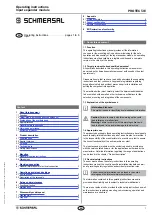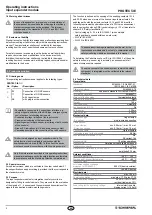
4
Operating instructions
Input expander module
PROTECT-IE
EN
6.2 Maintenance
A regular visual inspection and functional test, including the following
steps, is recommended:
1. Check the correct fixing of the input expander module
2. Check the cable for damages
3. Check electrical function
If a manual functional check is necessary to detect a possible
accumulation of faults, then this must take place during the
intervals noted as follows:
• at least every month for PL e with category 3 or
category 4 (according to ISO 13849-1) or SIL 3 with HFT
(hardware fault tolerance) = 1 (according to IEC 62061);
• at least every 12 months for PL d with category 3
(according to ISO 13489-1) or SIL 2 with HFT
(hardware fault tolerance) = 1 (according to IEC 62061).
Damaged or defective components must be replaced.
7. Disassembly and disposal
7.1 Disassembly
The input expander module must be disassembled
in the de-energised condition only.
Insert a screwdriver at the marked position, press in the direction of the
cover and remove.
2)
1)
61*
53**
Fig. 6:
1) Disassembly;
2) DIN rail system to EN 60715;
* with cage clamps;
** with plug-in terminals (representation of the standard version
PROTECT-IE-11)
7.2 Disposal
The input expander module must be disposed of in an appropriate
manner in accordance with the national prescriptions and legislations.
8. Appendix
8.1 Wiring examples
• Start level: Depends on the wiring of the safety relay module
• Sensor level: Dual-channel control of magnetic safety sensors to
IEC 60947-5-3
• Output level: dual-channel control of a downstream safety-monitoring
module
F1
S1
–
S2
S3
A2 A2
Y4
+
A1
K7
K8
K5
K6
K3
K4
K1
K1
K2
K2
14
24
S6
13
23
A1
+
–
S4
+
S5
–
Y3
UB
+
S7
–
S8
Y1
Y2
K1/K2
K3/K4
K5/K6
K7/K8
K1
K3
K5
K7
K2
K4
K6
K8
Protect-IExx
S12
S11
S22
S21
14
13
24
23
a)
Fig. 3
a) Safety-monitoring module, e.g. SRB 301MC, SRB 301ST, SRB 211ST
8.2 Sensor configuration
Dual-channel control of magnetic safety sensors to IEC 60947-5-3
(see Fig. 4)
• The control system recognises wire breakage and earth faults in the
control circuit.
• Cross-wire shorts between the monitoring circuits are detected.
• If the inputs S1, S3, S5 and S7 are not used, they have to be
bridged to +.
• If the inputs S2, S4, S6 and S8 are not used, they have to be
bridged to –.
S1
+
S2
Y1
a)
–
S3
+
S4
Y2
–
S5
+
S6
Y3
–
S7
+
S8
Y4
–
Fig. 4 a) signal outputs
Dual-channel emergency stop circuit to ISO 13850 and
EN 60947-5-5 (Fig. 5)
• The control system recognises wire breakage and earth faults in the
control circuit.
• Cross-wire shorts between the monitoring circuits are detected.
• If the inputs S1, S3, S5 and S7 are not used, they have to be
bridged to +.
• If the inputs S2, S4, S6 and S8 are not used, they have to be
bridged to –.
S1
+
S2
Y1
a)
–
S3
+
S4
Y2
–
S5
+
S6
Y3
–
S7
+
S8
Y4
–
Fig. 5 a) signal outputs
Dual-channel guard door monitoring to ISO 14119 (Fig. 6)
• The control system recognises wire breakage and earth faults in the
control circuit.
• Cross-wire shorts between the monitoring circuits are detected.
• If the inputs S1, S3, S5 and S7 are not used, they have to be
bridged to +.
• If the inputs S2, S4, S6 and S8 are not used, they have to be
bridged to –.
S1
+
S2
Y1
a)
–
S3
+
S4
Y2
–
S5
+
S6
Y3
–
S7
+
S8
Y4
–
Fig. 6 a) signal outputs
























